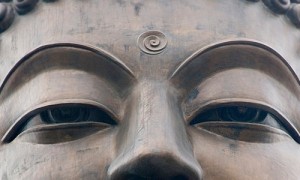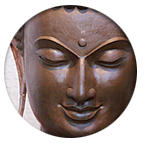All beings—from humans to insects—have the innate capacity to become enlightened. Yet we are like penniless people living on top of a gold mine; we live in spiritual poverty because we don’t tap our inner riches. To do so requires effort. We must undertake constant learning, examination and practice; we must combine knowledge and compassion. Ultimately, this awakens our primordial wisdom, allowing us to truly see.

 To see Rinpoche discuss what the mind is and how to understand it, please click here.
To see Rinpoche discuss what the mind is and how to understand it, please click here.Perception
Perception is innate, hard-wired in our systems. If someone pinches us, we feel pain. There is no belief or concept involved; it simply is.
Perception happens in an instant, before a thought even forms. When someone looks at a flower, the perceptual or sensory image creates a mental image, which leads to a thought: “A flower!” But by then the exact flower that was seen is already long past—like a single image in a moving film strip. The same principle applies to everything in life; for instance, people suffer when thinking about a relationship gone wrong, but by its nature, the relationship they suffer over is long past.
Concepts
Likewise, all our judgmental thoughts—whether something is good or bad, reasonable or unreasonable—are simply concepts. And at a broader level, seemingly tangible things are also simply concepts.
We turn on the tap. Something comes out. We say, “This is water. It’s drinkable.” But in a real sense it is not water at all; water is simply a word or a mental image, neither of which is drinkable. Objectively, there’s no relationship between what comes out of the tap, which is real, and the word water, which is a concept; that connection exists only in our brains.
While water offers an intellectual example, this is a clearer concern in more emotionally charged areas, such as interactions with others. By confusing concepts with reality we wrap ourselves in suffering, rather than freeing our minds from our problems.
Multiverse
While we see things both objectively and subjectively, our subjective view is far stronger. An individual’s “reality” is shaped by beliefs that are often self-reinforcing; yet those beliefs don’t dictate the only or the final reality. In fact, reality—both objective and subjective—changes depending on time, place and prevailing views.
For instance, some scholars believe that Buddha taught his followers that the world is flat and that the sun rotates around the earth. Perhaps he did; those were prevailing beliefs at the time—their reality—and he was sensitive to cultural norms. However, in later teachings to smaller, more advanced groups, Buddha mentions that the earth can be seen in different ways depending on our Karma.
Equally, our views of the universe have changed over time, from earth-centric to multi-verse. Buddha taught—as modern scientists are beginning to believe—that there is more than one universe. Indeed, there are thousands of universes—each one inside a greater universe endlessly, like the number of sand grains in the Ganges River. Our whole universe is a single grain of sand. Yet, within that scale, even one small change can alter the course of a planet, a river, a life. Nothing is permanent; anything is possible.
Relative Reality
The tangible realities of life—the connectedness and interdependence of every thought, action, and circumstance—are easily recognized on examination. And that recognition enables us to begin to break bad cycles, so we can live with positive intent.
We begin with the fundamental connection of all beings: We all breathe the same air, inhabit the same atmosphere, walk the same Earth. And we all seek happiness, safety, security.
Our knowledge is also interdependent. We learn from a teacher who is sharing knowledge from many other teachers, family, friends and personal experiences. Further, our understanding, our interpretation, even our retention of those teachings depends on our existing body of knowledge.
Even seeming opposites are interdependent: Day and night, hot and cold, good and bad only exist in relation to each other. Coming and going are in fact the same action; it simply depends on the direction from which we are looking.
Ultimately, our lives at any moment are the result of all our thoughts and actions up to this point—and they set the stage for more of the same. When our actions are good, our experience is good and we have more opportunity to do good; the same holds true for negative actions.
Through practice anyone can break a negative cycle, leveraging the moment of opportunity between feeling and grasping. This opportunity is not something that happens once in a lifetime—it can happen at any moment, over and over, every day.
Absolute Reality
Absolute reality is the truth that underpins all existence—but which we only see and understand through practice. While relative reality exists within the conceptual world, absolute reality exists beyond the conceptual world. It is difficult to fathom—rather like someone on the ground trying to measure the length of an airplane flying overhead; it looks about two inches long.
Absolute reality does not depend on who is viewing it, when they are viewing it, or the conditions or context under which it is viewed. It simply is.
By understanding even aspects of relative reality, we temporarily free ourselves from frustrations and unhappiness. In understanding absolute reality we completely free ourselves, having gained true insight and wisdom.

LIVE BETTER
Life is complex, puzzling and often painful.
Sometimes it seems there must be a better way
to manage—and there is. It is as simple as looking
at a problem through a different lens.



